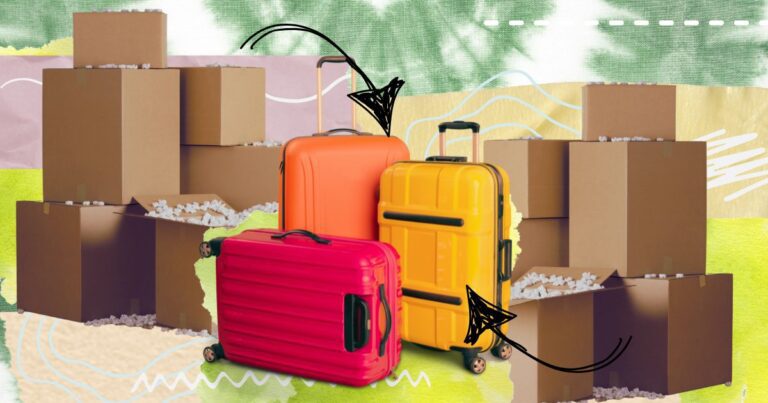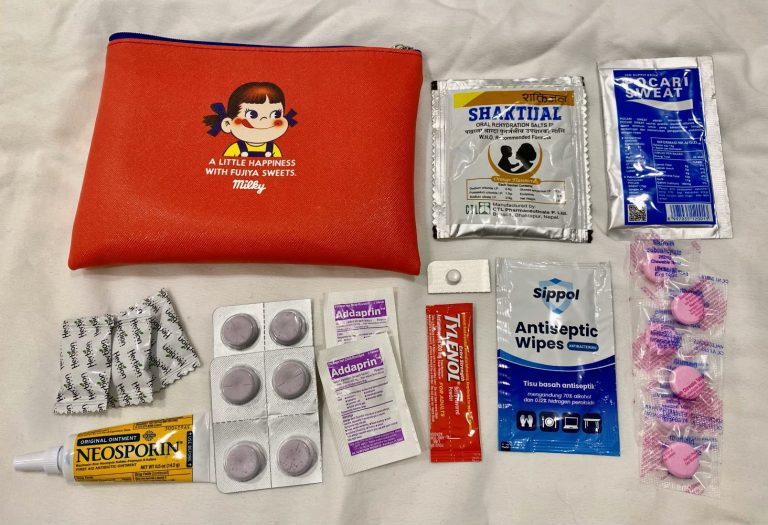Backpack vs. Suitcase for Long-Term Travel
Part of planning a life of constant travel is figuring out how you’re going to carry all your stuff with you.
Should you bring a backpack? WHICH backpack is best?
Or should you go with a traditional suitcase? How big should the suitcase be, anyway?
These questions can drive you literally up a wall if you let them, and to be honest they drove ME up a wall before I went on my first year of travel. I still flip-flop between decisions every time I go back to visit my parents and swap things out of my storage unit for the next year of travel.
Related: How to plan a year of travel
This post is to give you, the future nomad, some guidelines on how to chose your luggage for your life of full-time travel. The final decision will be different for everyone, but using some of the ideas in this post will help you figure out what to go with first.
Just Gone Wandering is supported by readers! This post contains affiliate links. If you click on a link and buy something, I get a small percentage at no extra cost to you. Your support helps keep this blog running— thank you! Read full disclosure here.
Which will work best for you?
The easiest way to decide what to pick as your luggage is to plan out what you’re going to do for the next year. Think only of the next 12 months, and how you’re going to travel through them.
What kind of travel do you see yourself doing?
If you’re going to be working regularly, staying in short-term accommodation like AirBNBs or sharehouses, and moving cities or countries only once a month or so, then a suitcase is totally fine.
If you’re going to be moving between hostels every 3 days, using public transit like buses and tuk tuks, going into more rural areas, then a backpack is better.
We’ll go more into the details of each decision in the rest of the post. Keep reading!
What I use in my nomad life

I’ve actually done both suitcase and backpack, and I have found each useful in their own way.
I go by my own advice: when I’m staying in apartments for a month or more, a suitcase works fine and means I can take more spices and journal supplies with me. I can carry extra toothpaste or more t-shirts and be very happy.
When I’m traveling quickly between cities, not focusing on work and going out sightseeing everyday, then a suitcase may not work best. In particular, I really hate lugging suitcases on buses and trains, and trying to cram it into tiny shared dorms. In that situation, a backpack works best.
Right now I’m using a suitcase, as I’m in my “digital nomad” era where I’m holed up in various apartments furiously working on this blog. But I’m hoping that next year I’ll have more time to travel fast, and I plan to switch back to a backpack.
Switch when you need to! You aren’t stuck with whatever you chose the first time. If one ends up not working out, then swap to the other one.
Now we’ll get into the nitty-gritty of backpacks vs. suitcases and how they impact your travel life.
Should you take a suitcase?
Suitcase Pros
- Easiest way to switch from vacation packing to long-term travel packing, as you don’t have to pare down your packing list quite as tightly.
- Once you get used to nomad life, you’ll be cut down on non-essentials better.
- Can take extra stuff like kitchen supplies and even hobby items.
- Wheels make it easier to take through airports, train stations, down streets to hotels, etc.
- Good for those with weaker backs, or who don’t want to carry a heavy bag.
Suitcase Cons
- Suitcases weigh more than backpacks, especially hard-sided ones. You’ll quickly reach an airline’s carry-on limits and have to pay for extra weight, or to check it in.
- Slight increase in transit costs as you’ll have to take taxis or Grab cars rather than cheaper (smaller) tuk tuk or Grab bikes.
- More likely to pack stuff you don’t use and won’t need. Very easy to horde things “just in case” because you have more room to tote it around.
- May have to lift it up and down stairs at accommodation or train stations. Many old buildings don’t have elevators, which could mean quite a few stairs to get up and down.
Suitcase Options
Hard-sided vs. Soft-sided
Hard-sides suitcases with four wheels are the most popular right now, and they’re very sturdy and easy to pull around. They’re easy to clean!
Downsides: the casing can crack, wheels can break off, and they’re the heaviest of all the suitcases.
Soft-sided suitcases (usually with two wheels) are more lightweight and can squish into places the hard-sided ones can’t, but they’re prone to getting dirty and ripping.
Carry-on vs. Checked Suitcase
If you’re not a fashionista who needs a lot of clothes, or you don’t need specific things for hobbies, then do yourself a favor and stick to carry-on size.
A smaller suitcase will keep you from overpacking and you’re much less likely to go overweight, saving you money and physical pain (you WILL have to lift that thing eventually). Future you will be MUCH happier, I promise!
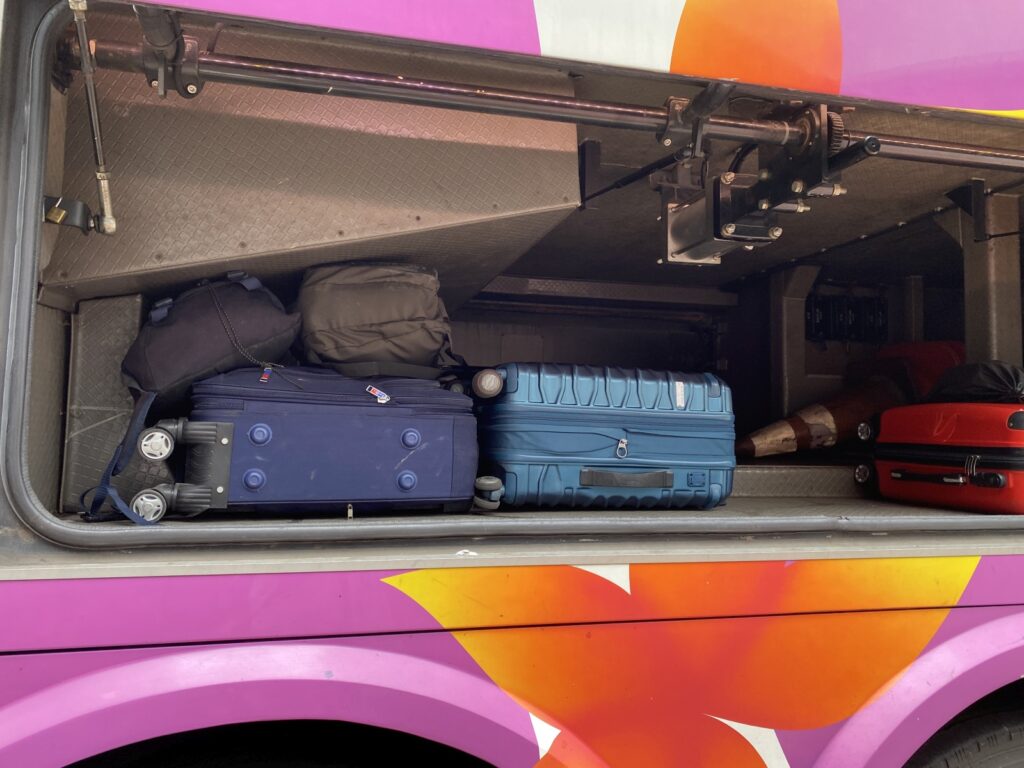
Top Suitcase Picks
Samsonite
My preferred suitcase is a hard-sided Samsonite carry-on spinner, which I got three years ago and held up well through Europe (1 year) and Asia (4 months so far). It’s got a heavy base weight (nearly 8lb), but it’s sturdy and if I don’t overpack it I can still lift it into the overhead bin when needed.
Osprey
What’s a wheeled duffel bag if not a soft-sided suitcase, eh? Osprey are the kings of backpacks and their rolling bags are just as good. I’m seriously considering snagging one of these duffles whenever my suitcase finally kicks the bucket.
Cotopaxi
Cotopaxi recently debuted a roller version of their Allpa backpacks. I really like their backpacks (I have an Allpa 35l ready to go) and this is a rolling version of that! I love the colors and the organization in this bag in particular.
Should you take a backpack?

Backpack Pros
- Super easy to grab and go.
- Can fit in anywhere (as long as the bag isn’t too big) and take any kind of transit, including the cheapest ones.
- Have to pack light so you’re less likely to be carrying useless stuff around.
- Easier to get the free carry-on luggage option for cheaper airlines.
- Easier to stash in a hostel room locker, train station locker, luggage storage area, etc.
- If it’s small enough, you can keep it with you on buses and trains! Less likely to get stolen!
- Much easier to take up and down stairs!
Backpack Cons
- Can get VERY heavy very quickly, especially if you have a large bag.
- Can actually damage your spine if you’re not careful!
- Prone to hitting people on buses and metro cars if you keep it on your back. (Take it off, please.)
- Stereotypical “backpacker” look which can make things awkward if you’re trying to go somewhere fancy.
- Potentially easier to damage, if it gets ripped.
- Gotta take it into the airport/train/ferry bathrooms and sometimes there’s nowhere to put it down without getting gross.
Backpack Options
Travel Backpack vs. Hiking Backpack
A travel backpack opens like a suitcase, has sturdier materials and (usually) internal organization. It’s aimed at travelers so it’s usually got better features like a laptop sleeve, stow-away straps and lots of pockets. While they may have a hip belt, they usually don’t have load lifters or other things like that to make carrying heavy loads easier– they’re just mean for getting from the plane to your hotel.
A hiking backpack opens from the top, better suspension and tends to be more lightweight. It’s good for taking to more rural areas as they can usually take more of a beating– tossing up into a boat or minibus roof rack isn’t a big deal.
Either kind of backpack is fine, but a travel backpack is a little easier to deal with if you’re moving quickly between locations. You can open it all the way and get whatever you need without having to dig through the whole backpack.
However, if you’re carrying camping stuff like a sleeping bag and a stove, or if you think you’ll need to do a lot of walking with your bag, then get a hiking backpack. It’ll be way more comfortable to carry because the internal frame, load lifters, etc. can handle weight distribution better than a travel backpack.
What size backpack?
As small as you can make it!
Save your back and PACK LIGHT.
I traveled with a 27l backpack for nearly a year, so it can be done– but if it’s your first time, then starting with a slightly bigger bag at 35l or 40l is okay. The first pack out is always the worst, because you don’t know what you’ll need or what you’ll want. Starting with a smaller bag right away will at least keep you from massively overpacking at the start.
Related: What to pack for long-term travel
Top Backpack Picks
Osprey
The easiest one to start with as it’s a great brand and found nearly everywhere in the US and Europe.
The Osprey Fairview 40L travel backpack is the most-recommended backpack on every travel group I’ve ever been in, and it’s a solid backpack for long-term travel. Good overall design, great fabric, not too heavy, and doesn’t cost too much. Downside: it makes you look a little like a turtle when it’s packed full.
North Face
This is the brand I use! My North Face Borealis backpack has held up well and even into my third year of use (2 years as a daypack and 1 year as my main pack) it’s barely got any wear on it. I’d like it a bit more if it opened all the way, but overall it’s a good bag.
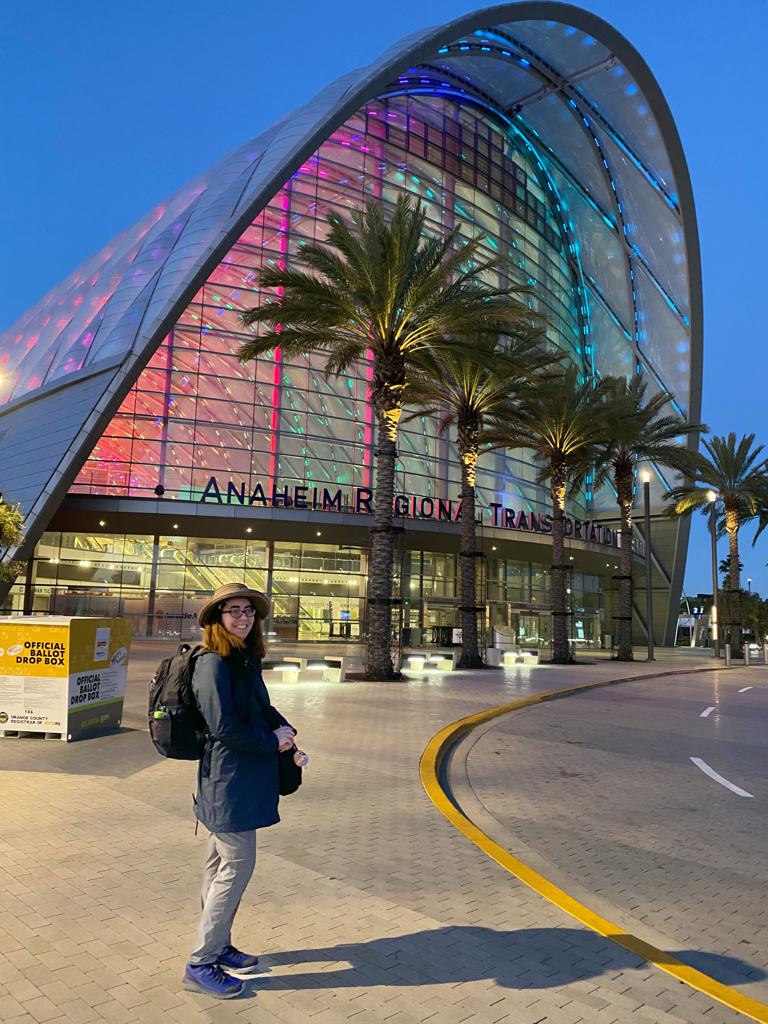
Forclaz
This is a Decathlon store brand; Decathlon is like the European REI, basically, but you can also find them in Asia and South America (and the US, actually). It’s a good brand for decently-made bags at a good price, and they even have travel backpacks now instead of just hiking ones.
Final Thoughts
Really, it almost doesn’t matter what you pick because you’ll be adjusting and changing your packing list constantly anyway. If you start with one and decide it’s not working out, switch to the other! As long as you’re comfortable and can carry what you need, then suitcase or backpack or both is totally fine.
What kind of luggage do you use in your nomad life?
Save to Pinterest

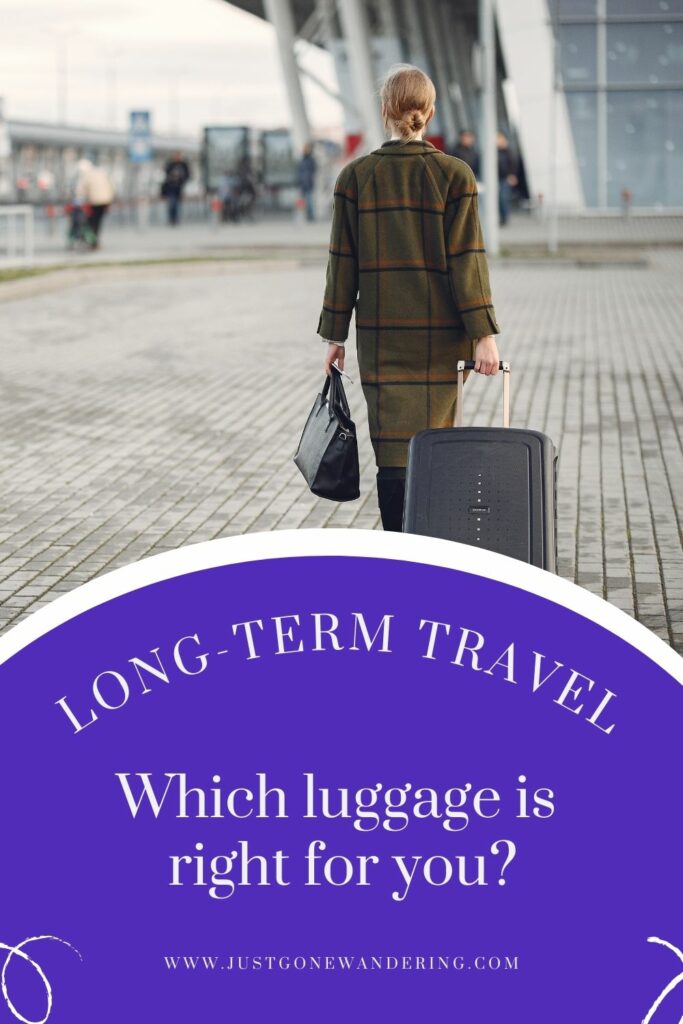
Explore More
Nomad Living
- How to Plan a Year of Full-time Travel
- Packing List for Perpetual Travel (Solo Female Cozy Budget Style)
- Backpack vs. Suitcase for Long-Term Travel
- How to keep in contact while traveling abroad
- The BEST WhatsApp Travel Group Chats
- 90+ Active Facebook Groups for Travelers
- Where to Stay Besides Hotels When Traveling Long-Term
- Travel kitchen essentials | Hotel cooking
- Best Resources for Long-Term Travel
Best Travel Resources
- 👩💻Stay organized with the Deluxe Travel Planner Spreadsheet
- 🛌Search Hostelworld for budget stays
- ✈️Search SkyScanner for discounted flights around the world
- 😺Join TrustedHousesitters and do petsitting in exchange for accommodation
- 💳Carry Chase Sapphire Preferred for a travel-friendly credit card
- 📱Use Airalo for eSIMs around the world
- 🚙Check DiscoverCars for international car rentals
- 👩💻Snag ExpressVPN to stay safe while browsing the web
- 🧑⚕️Sign up with VisitorsCoverage for trip insurance



